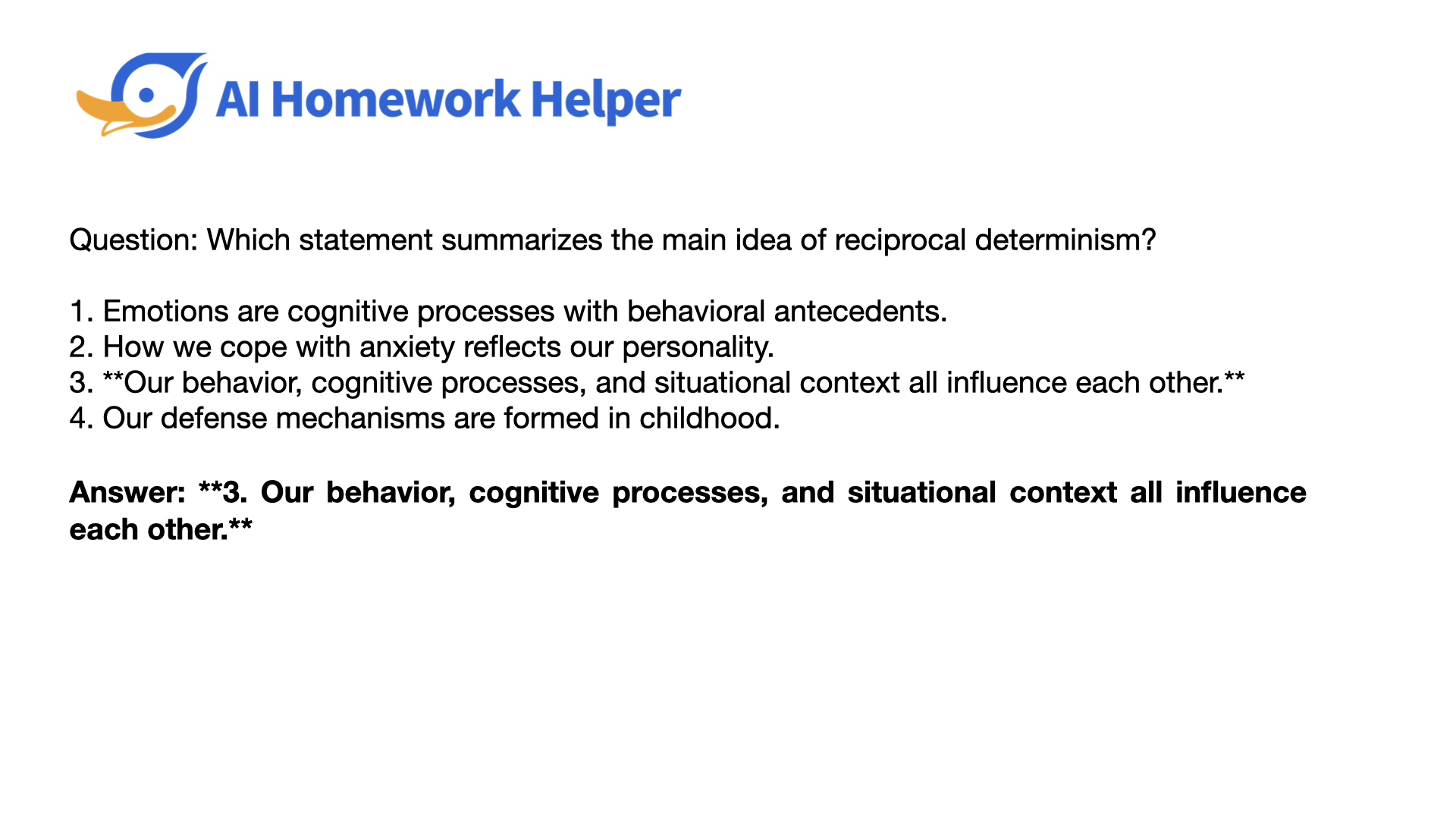
Which statement summarizes the main idea of reciprocal determinism?
Question: Which statement summarizes the main idea of reciprocal determinism?
- Emotions are cognitive processes with behavioral antecedents.
- How we cope with anxiety reflects our personality.
- Our behavior, cognitive processes, and situational context all influence each other.
- Our defense mechanisms are formed in childhood.
Answer: 3. Our behavior, cognitive processes, and situational context all influence each other.
Brief Explanations:
Option 3: Our behavior, cognitive processes, and situational context all influence each other.
This is the correct statement that accurately summarizes reciprocal determinism. Reciprocal determinism, a concept introduced by Albert Bandura, emphasizes the dynamic and reciprocal interaction between an individual's behavior, personal cognitive factors (such as thoughts and emotions), and the external environment or situational context. This interplay suggests that not only does the environment influence an individual's behavior and cognition, but the individual's actions and thoughts can also shape and alter their environment.
Why the Other Options Are Incorrect:
-
Emotions are cognitive processes with behavioral antecedents.
Incorrect. While emotions are related to cognitive processes and can influence behavior, this statement does not capture the reciprocal and interactive nature of reciprocal determinism involving behavior, cognition, and environment. -
How we cope with anxiety reflects our personality.
Incorrect. This statement pertains more to the relationship between coping mechanisms and personality traits, rather than the broad, interactive framework of reciprocal determinism. -
Our defense mechanisms are formed in childhood.
Incorrect. This statement aligns more with psychoanalytic theories (e.g., Freud) regarding personality development and defense mechanisms, not with reciprocal determinism.
Extended Knowledge:
Reciprocal Determinism Explained
Reciprocal Determinism is a foundational concept in Albert Bandura's Social Cognitive Theory. It proposes that a person's behavior both influences and is influenced by personal factors and the social environment. This triadic reciprocal relationship highlights that:
- Behavior: Actions and reactions of an individual.
- Cognitive Processes: Thoughts, beliefs, expectations, and attitudes that influence how one interprets and interacts with the world.
- Environmental/Situational Context: External factors, including social interactions, cultural norms, and physical surroundings.
Key Components:
-
Behavior Influencing Environment: An individual's actions can modify their surroundings. For example, a student who actively participates in class may create a more engaging and interactive classroom environment.
-
Environment Influencing Behavior: The external context can shape how an individual behaves. For instance, supportive family dynamics can encourage positive behaviors, while a stressful work environment might lead to increased anxiety or burnout.
-
Cognition Influencing Behavior and Environment: Personal beliefs and thoughts can affect how one behaves and perceives their environment. A person who believes they can succeed is more likely to take proactive steps toward their goals, thereby influencing their environment positively.
Applications of Reciprocal Determinism:
-
Education: Understanding how students' beliefs about their abilities (self-efficacy) interact with teaching methods and classroom environments to influence learning outcomes.
-
Psychology and Therapy: Utilizing cognitive-behavioral techniques that address both thought patterns and behaviors to create positive changes in an individual's life and environment.
-
Organizational Behavior: Recognizing how employee attitudes and behaviors interact with company culture and policies to affect overall workplace dynamics and productivity.
Contrast with Other Theories:
-
Behaviorism: Focuses primarily on observable behaviors and external stimuli, often neglecting internal cognitive processes.
-
Psychoanalytic Theory: Emphasizes unconscious processes and childhood experiences in shaping behavior, without explicitly addressing the bidirectional influence between behavior, cognition, and environment.
Importance in Modern Psychology:
Reciprocal determinism underscores the complexity of human behavior by acknowledging the multifaceted interactions between internal and external factors. It moves beyond simplistic cause-and-effect models, providing a more comprehensive framework for understanding how individuals navigate and shape their lives within varying contexts.
Examples Illustrating Reciprocal Determinism:
-
Health Behavior:
- Behavior: Regular exercise.
- Cognition: Belief in the benefits of fitness.
- Environment: Access to gyms or safe outdoor spaces.
Interaction: Believing in the benefits encourages regular exercise, which may lead to improved health and increased motivation to maintain fitness, thereby reinforcing the belief and possibly influencing the creation of more fitness-friendly environments.
-
Career Development:
- Behavior: Seeking professional development opportunities.
- Cognition: Desire for career advancement.
- Environment: Supportive workplace policies.
Interaction: A proactive approach to career growth influenced by personal aspirations is supported by a workplace that offers training and advancement opportunities, further encouraging continued professional development.
Conclusion:
Reciprocal determinism provides a nuanced understanding of human behavior by highlighting the continuous and mutual interactions between personal factors, behaviors, and the environment. This comprehensive perspective is essential for fields like psychology, education, and organizational development, where fostering positive outcomes requires addressing multiple interacting elements.